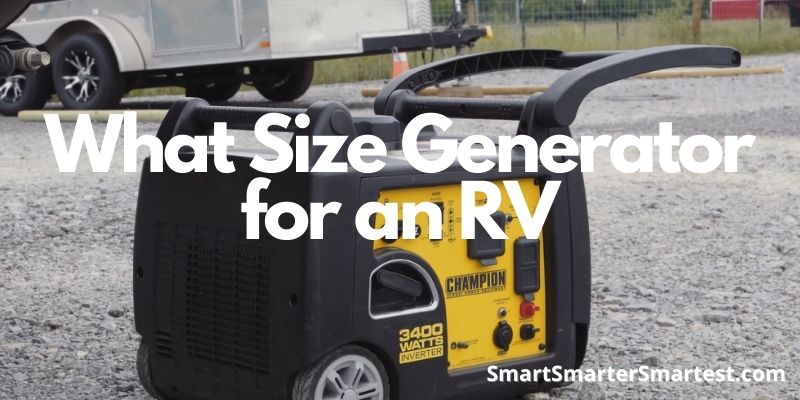Looking to take your RV out for an extended trip, but worried about being tethered to electrical hookups because your trailer isn’t equipped with its own generator? Most motor homes come with their own generators, but many simpler trailers don’t, which can be a problem for those interested in “dry camping” or “boondocking” (parking somewhere without the electricity and water sources that paid campgrounds often have).

Fortunately, there’s an easy solution to this problem. Portable generators allow you to power your RV without an electrical hookup, giving you the freedom to leave the caravan park behind and really get out into nature. The right generator can make boondocking much easier and open up a whole new range of far flung destinations.
That being said, it’s important to find a generator that’s going to meet your RV’s power requirements. It’s easy to feel intimidated when faced with the wide variety of generators on the market, but have no fear! This article will provide you with guidelines to illuminate your search for the right one.
The first thing to figure out is how much wattage you’re going to need. And if you want to run air conditioning in your camper, that’s what’s probably going to put the most demand on your generator. Believe it or not, it actually takes more power to get you’re A/C unit started than to keep it cooling your RV. So, knowing the wattage necessary to power up your air conditioner will give you the minimum power requirement for your generator.
###list of items###
As you can see, running a 13,500 British Thermal Unit (BTU) air conditioning unit requires a generator with a maximum power of at least 3,000 watts. But once you’ve got your air conditioner up and running, you’ll likely want to use some other appliances as well. To get an accurate estimate of how much wattage these appliances will require, the fool-proof option is to check the labels on the appliances themselves and record those values. For now, this chart will give you a general idea of how much power some common appliances typically use:
###list of items###
Another thing to keep in mind is that generators usually have a running wattage rating and a starting, or maximum, wattage rating. Take that 3,000 watt generator mentioned earlier: its starting wattage may provide the 3,000 watts needed to get the air conditioner going, but its running wattage for extended operation might only be 2,500 watts.
Let’s say that your 13,500 BTU air conditioner runs at 2,000 watts. That means you have 500 watts remaining. Will you be able to run your refrigerator, have the TV on, listen to the radio, and start cooking dinner at the same time? To find the answer, it’s necessary to take into account both the max starting wattage and running wattage of the appliances you plan on using simultaneously.
Assuming you power on your refrigerator with the air conditioning unit already running, you’d only be left with 500 starting watts and 350 starting watts:
3,000W starting wattage: 2,000W A/C running + 500W Refrigerator initiation + 500W Miscellaneous
2,500W running wattage: 2,000 A/C running + 150W Refrigerator running + 350W Miscellaneous
If you want to use your refrigerator, air conditioner, microwave, sound system, and television at the same time, it’s probably best to get a more powerful generator.
FAQ
What size RV generator do I need?
The free calculator contained in this post can be used to answer this question most accurately. It’s safe to assume that if you don’t have air conditioning, you shouldn’t need a generator to produce more than 2,500 watts.
With one normal-sized air conditioner with 13,500 BTU to 15,000 BTU of cooling power, the ideal solution would be to acquire two 2,000 watt generators and use them in tandem. This solution will leave you with enough extra power to operate other appliances at the same time as the A/C.
If you use generators providing 3,600 watts or less, they are likely to be inverter-type generators. That’s good news, because inverter generators tends to run more quietly (those providing more wattage will produce more noise, which might not be what you’re looking for if you’ve hopped into your RV to escape the city). So, if you used a pair of Honda EU2200i model generators together, that would allow you to run your 13,500 BTU air conditioner and a few other appliances to boot.
If you want to run more than one air conditioner at the same time, the RV will likely need to have a 50 Amp electrical service and a built-in generator.
How much wattage is necessary to power my entire recreational vehicle?
A recreational vehicle with a 30 Amp electrical service, supplying its devices with a 120 volt current, will use a maximum of 3,600 watts.
An RV with a 50 Amp service connected to an electrical source at a caravan park by two 120 volt cables can supply up to 12,000 watts – enough to run all the appliances you want at the same time.
If your generator produces less wattage than what your recreational vehicle is capable of handling, that doesn’t mean that the generator won’t work. It just means that your maximum wattage will be the number listed on the generator, not the RV’s top capacity.
Keeping all that in mind, it’s time to get out your pencil and paper and calculate how much wattage you need. Then you can buy the generator that’s best for you, and get out on the road!